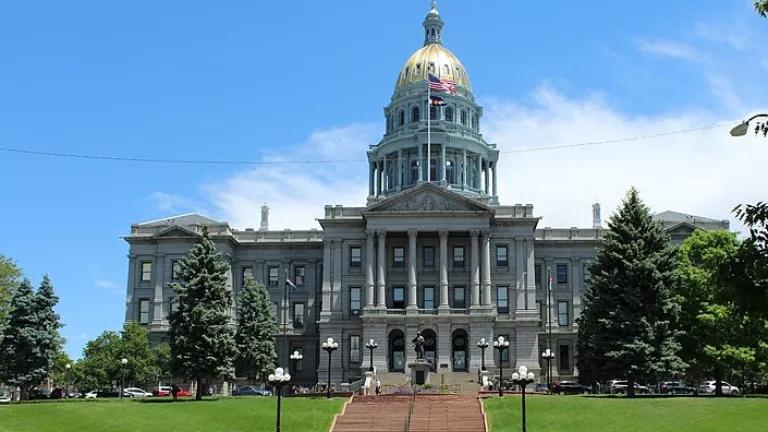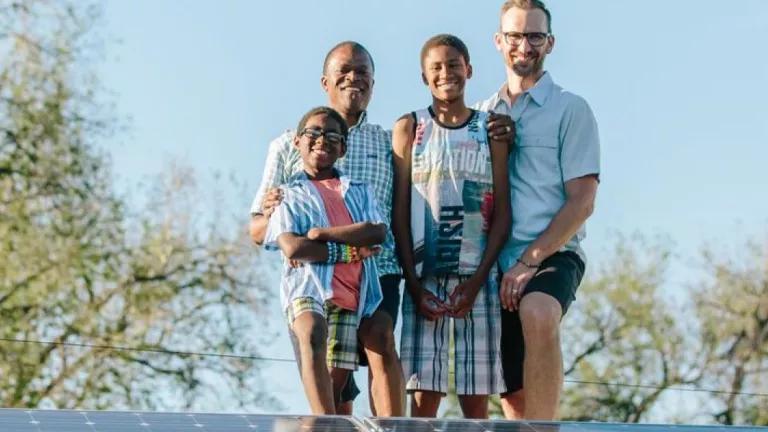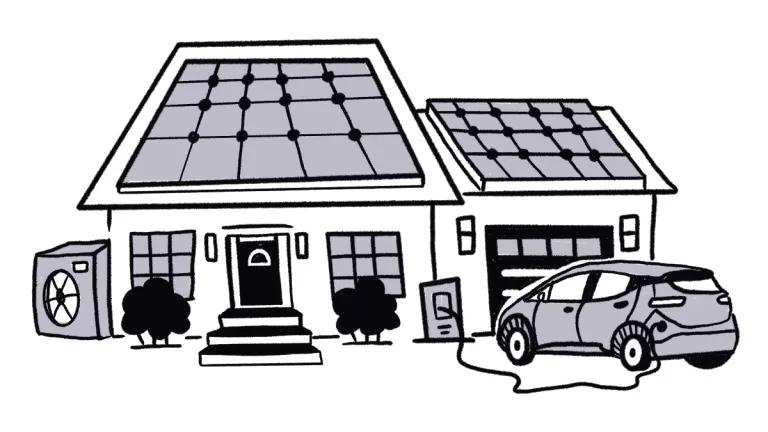Colorado Legislative Roundup 2022
The 2022 session brought about major victories for our health and environment and big opportunities for us to continue to invest in a clean, healthy and fair Colorado for all.

Colorado State Capitol building
Another year, another legislative session completed with Governor Jared Polis’s veto window closed. The 2022 session brought about major victories for our health and environment and big opportunities for us to continue to invest in a clean, healthy, and fair Colorado for all. Throughout months of negotiations, the NRDC team worked with legislators, state leaders, and coalition partners to pass and sign into law critical climate, clean energy, and clean air reforms.
A number of themes rose to the top as critical priorities for the state, and many of the bills below seek to address the issues of:
- Air quality: Following a summer of historically polluted air, legislation worked to address some of the leading causes of air pollution.
- Wildfire response: After the devastating Marshall Fire last December, which was the costliest disaster in Colorado’s history with more than $1 billion in insurance claims, multiple bills sought to mitigate the risk of fires in the future while helping impacted homeowners, like NRDC partner Susan Nedell, now.
- Equity: With the rising cost of living, a historic shortage of housing, and disproportionate impacts of climate change and air pollution felt by communities of color and low-income communities, helping folks who are most impacted was a top priority. Our work also supported a just energy transition for communities where jobs and career pathways will be impacted by changing energy needs.
- Clean economy: Business and industry play a critical role in a more sustainable Colorado, so multiple bills introduced programs to help clean up operations, including increased recycling and incentives for voluntary measures.
Here are some of the bills NRDC supported this year to help Colorado achieve its crucial climate, environmental, and public health goals:
Expanding access to multimodal and electric transportation
- Programs to Reduce Ozone Through Increased Transit (SB22-180) invests $28 million for transit agencies statewide to provide at least one month of fare-free transit during the ozone season for the next two years. It also invests $30 million in Colorado Department of Transportation’s regional bus service, Bustang, and adds $10 million to the Revitalizing Main Streets program.
- Air Quality Improvement Investments (SB22-193) allocates $12 million for electric bike rebate programs and community bike share, and $65 million to help school districts replace diesel school buses with electric ones. It also establishes a grant program for voluntary projects that improve energy efficiency and increase electrification of industry and manufacturing.
- Alternative Transportation Options Tax Credit (HB22-1026) incentivizes employers with a tax credit for providing employees with more sustainable commute options, such as transit passes, ride sharing or car sharing, or bike and scooter options. This bill helps improve equity by requiring the options to be offered to all employees, including part-time or hourly workers.
Advancing efficient and resilient buildings and homes
- Building Greenhouse Gas Emissions (HB22-1362) requires municipalities or counties that update any building codes to also update to the 2021 international energy code, which saves 10 percent more energy than previous codes, and add standards to make new buildings ready for solar panel and electric vehicle infrastructure. The timeline for adoption is currently flexible so there is an opportunity to strengthen this legislation in the future by creating a firm, near-term deadline of 2025.
- Disaster Preparedness and Recovery Resources (SB22-206) provides much-needed financial assistance to rebuild sustainably after fires and other natural disasters (starting with those affected in 2018) and provides aviation and firefighting resources. It will position Colorado as a leader in sustainable rebuilding efforts and will help reduce our carbon emissions. The legislature invested $35 million for home rebuilding programs and for the office of climate preparedness to help coordinate and rebuild with energy efficiency in mind. Renters can benefit, too, from assistance in the event their residence is impacted by a disaster.
- State Grants Investments Local Affordable Housing (HB22-1304) creates two grant programs to help advance affordable and more efficient housing. The Strong Communities grant program allocates $40 million for local governments to invest in sustainable land use practices, including infill. Smart land use makes development more efficient and transit-friendly, and it helps reduce housing costs while expanding access to more housing.
Ensuring a just clean energy future
- Fund Just Transition Community and Worker Supports (HB22-1394) transfers $15 million from the general fund, with $5 million allocated to the just transition cash fund and $10 million allocated to the coal transition workforce assistance program account, and directs the Department of Labor and Employment, through the Office of Just Transition, to expend the money for specified coal community and worker supports. This funding will help support NRDC’s efforts to engage frontline communities in the transition to a clean energy future.
Reducing waste and supporting sustainable lifecycles
- Waste Diversion and Circular Economy Development Center (HB22-1159) creates a circular economy development center whose purpose is to grow existing markets, create new markets, and provide necessary infrastructure, logistics, and marketing to create a sustainable circular economy for recycled commodities in Colorado. The benefits include a robust local source for essential manufacturing materials, including paper, glass, metal, and plastics; less waste going to the landfill; reduced transportation costs and emissions; and local job creation. This bill prevents Coloradans from needlessly throwing away valuable feedstock that could contribute to a robust supply chain and add jobs in the clean economy.
Protecting public health
- Public Protections from Toxic Air Contaminants (HB22-1244) requires the Air Quality Control Commission to identify five priority air toxics and establish health-based standards for them. It also expands monitoring from one to six sites across the state to test for a broad range of air toxins and requires public input on locations. The bill also establishes a statewide inventory and reporting to the state on emitted air toxics and requires a study to evaluate the need for an air toxics permitting program. Taking action on dangerous air toxics was a top priority for a coalition of environmental justice and health organizations.
Though we had many meaningful wins, there were other moments when strong legislation was amended below our standards, such as with our “Filter First” legislation to remove lead from drinking water in schools. A broad piece of climate legislation, Reduce Greenhouse Gas Emissions in Colorado, which would’ve, among other things, set interim emissions reductions targets, didn’t make it through the legislature in the final days to ensure successful passage of other bills. Another smart policy, which would’ve required new and renovated multifamily and commercial buildings to include basic electrical infrastructure to pave the way for EV charging, was passed with bipartisan support only to be disappointingly vetoed by the governor.
We’re already thinking about what needs to happen next year, and we’ll continue to work hard alongside our partners to meet this critical moment to invest in a climate-resilient future for Colorado.




